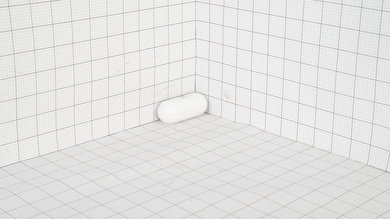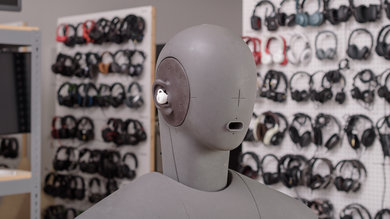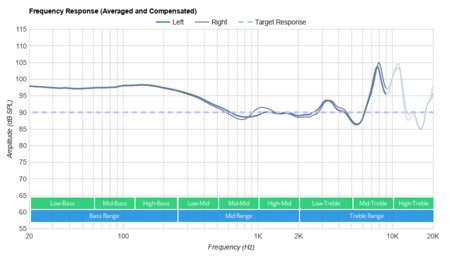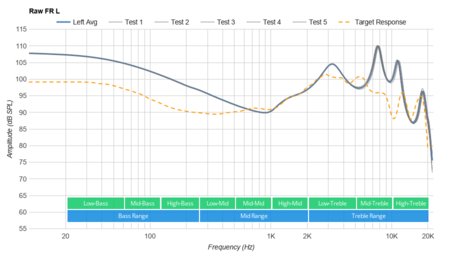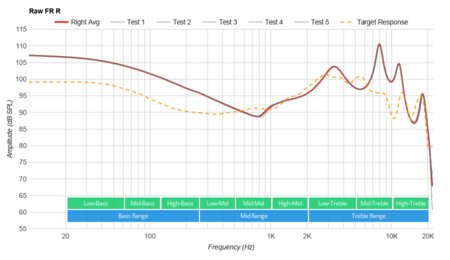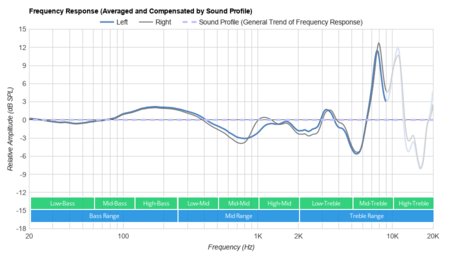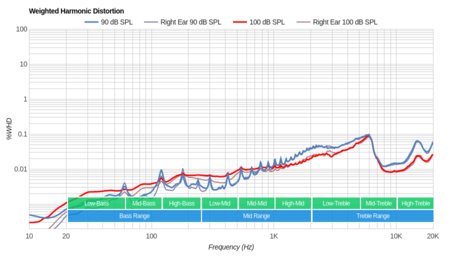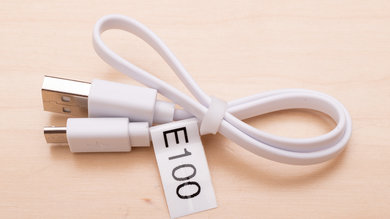The Raycon E100 are decent truly wireless headphones that are fairly versatile. They have a v-shaped sound profile that has more emphasis in the bass and treble ranges. They have an in-ear fit that isn’t the most comfortable but blocks a lot of ambient noise. Unfortunately, their battery life is disappointing, and their microphone is pretty bad for calls. On the upside, they're rated IPX7 and feel more premium than the Raycon E50 Truly Wireless.
Our Verdict
The Raycon E100 are okay for mixed usage. These headphones have an excited, V-shaped sound profile better-suited for bass-heavy music and won’t be ideal for critical listeners looking for a neutral sound. They aren’t the most comfortable to wear, and their battery life is disappointing. On the upside, their fit isolates well against ambient noise, which is good for commuting or blocking out noise at the office. Also, they're portable, breathable, and are rated IPX7, which is great for sports. These truly wireless headphones have a noticeable delay with video content and won’t be a good option for watching TV or gaming.
- Good isolation performance.
- Well-built design.
- Can be uncomfortable after a while.
- Short battery life.
- Excited, V-shaped sound profile.
- Sub-par microphone performance for calls.
The Raycon E100 are acceptable for neutral sound. These headphones have a very excited sound profile, with an overemphasis on the bass and treble ranges, which isn’t ideal if you’re looking for a neutral sound. They can also be uncomfortable for people who don’t like the fit of in-ears.
The Raycon E100 are good for commuting. These headphones have decent isolation against bass frequencies, meaning they’ll cancel out the deep rumble of bus engines. Their battery life isn’t the longest, but it should last you long enough for your daily commute. On the upside, they're very portable and easy to carry around.
The Raycon E100 are great for sports and fitness. They're stable enough for most sports, thanks to their stability fin design. They don’t move too much around in the ear unless you pop the air-tight seal. On the upside, they're also very portable and breathable, as you shouldn’t sweat more than usual. They're also rated IPX7 for water resistance.
The Raycon E100 are adequate for the office. They have a very good isolation performance in work environments, and you can easily reduce the level of ambient chatter and the noise coming from the A/C unit. However, they aren't the most comfortable in-ears, and their battery life isn’t long enough to last a full workday.
Changelog
- Updated Mar 02, 2020: Converted to Test Bench 1.4.
- Updated Nov 21, 2019: Converted to Test Bench 1.3.1.
- Updated Nov 21, 2019: Converted to Test Bench 1.3.
- Updated Oct 28, 2019: Review published.
Check Price
Popular Headphones Comparisons
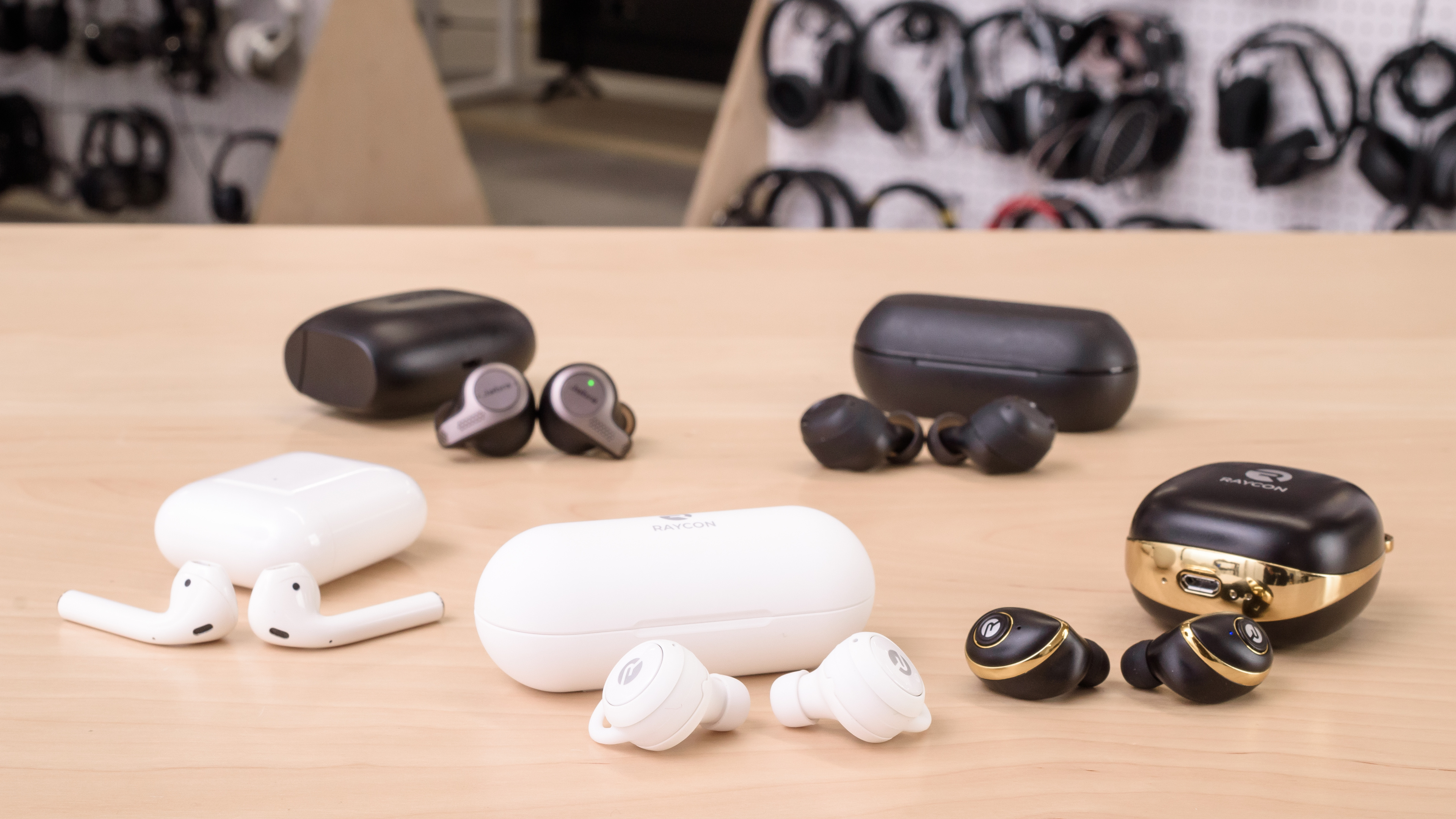
The Raycon E100 are truly wireless headphones that have an excited, v-shaped sound profile. They have an in-ear fit and might not be the most comfortable option. On the upside, their passive isolation performance is great.
See our recommendations for the best true wireless earbuds, the best wireless Bluetooth earbuds under $100, and the best earbuds for bass.
The Samsung Galaxy Buds are better headphones than the Raycon E100 Truly Wireless, especially if you have an Android phone, giving you access to their app. The Samsung are noticeably smaller and more comfortable, on top of having a better audio reproduction. They have a touch-sensitive control scheme, rather than physical buttons like the E100. They also have a better battery performance. On the other hand, the E100 have a better isolating fit which is good for blocking out noise and they come with more tip options.
The Anker SoundCore Liberty Lite Truly Wireless are better-sounding headphones than the Raycon E100 Truly Wireless. The Anker have a more neutral sound, while the Raycon have a V-shaped profile, with overemphasized bass and treble. However, the Anker battery life is horrible, with only about two hours of continuous playback. The Anker also have more latency than the Raycon.
The Raycon E100 Truly Wireless are better than the Raycon E25 True Wireless for mixed usage. Although the E100 have an overemphasized bass and a sharp treble, they're significantly more accurate in their audio reproduction and have much better noise isolation. Build quality is also much improved over the E25; however, their battery life is quite disappointing, only lasting about 3.5 hours per charge.
The Raycon E100 Truly Wireless and the Jabra Elite 65t Truly Wireless are similar headphones, but the Elite 65t have a small edge. They have a more neutral sound profile and are compatible with a companion app that allows some customization. Their microphone performance is also better. However, the wireless range of the E100 is impressive and one bud can be used while the other is charging, which you can’t do with the Elite 65t. On the other hand, the Jabras have longer battery life on a single charge.
Test Results

The Raycon E100 have a fairly circular design. They have a big button with Raycon’s logo and a sporty look thanks to the stability fins. They don’t protrude too much out of the ear and don’t stand out too much. They come in black, white, or blue.
The Raycon E100 have a typical in-ear fit that isn’t the most comfortable. On the upside, they come with five other tip options and a different-sized stability fin to help you find the best fit for you. If you usually find that in-ears aren't comfortable, you'll have the same issues with these headphones. For slightly more comfortable in-ears, check out the Raycon E55 Truly Wireless or the smaller Raycon E25 True Wireless.
The Raycon E100's control scheme is okay. You get most expected controls like play/pausing music, track skipping, volume controls, and taking calls. However, it’s not the most intuitive, as raising or lowering the volume is done with triple taps, which is annoying if you're looking to change your volume quite a bit. You can also trigger your voice assistant easily. The buttons are clicker than the Raycon E50 Truly Wireless but don’t offer any audio feedback.
The Raycon E100 come with a nice hard charging case. The headphones are protected against scratches, minor water exposure, and physical damage from falls. The case feels very well-made but isn’t on par with the premium feel of the Sennheiser Momentum True Wireless or the Bang & Olufsen Beoplay E8 2.0 Truly Wireless 2019. On the upside, it has four lights that give you battery information.
The Raycon E100 are better built than the Raycon E50 Truly Wireless. The materials used feel more durable, and they're also rated IPX7 for water resistance. They feel robust and dense, meaning they should survive accidental falls without too much damage.
The Raycon E100 are stable enough for sports. Their stability fin design helps get a secure fit, and head movement doesn’t make them move around. However, since they provide a very air-tight seal, popping the seal might make them wobble around in your ear, and it'll be frustrating to replace if it happens often.
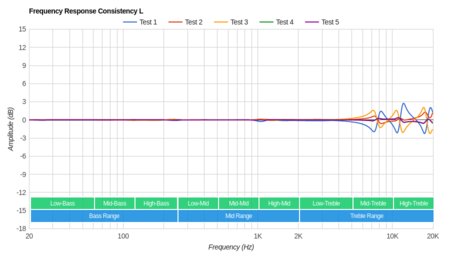
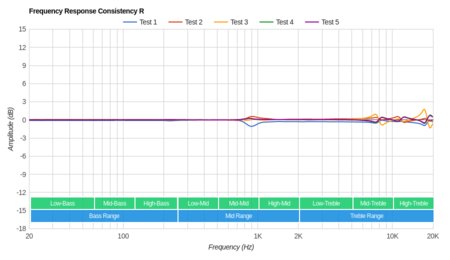
Thanks to their in-ear fit, the Raycon E100 have fantastic frequency response consistency. This means users will have a very similar audio reproduction when using these headphones.
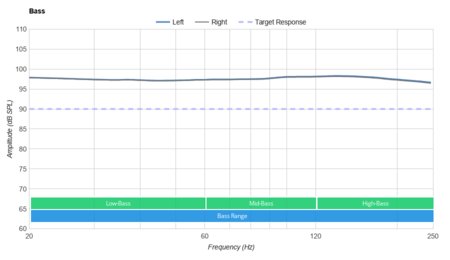
The Raycon E100's bass performance is great. Although the response is slightly over our target curve, it's well-balanced and flat. This means that these headphones will produce great bass with a bit of extra thump and punch. Some people may prefer this, especially if you listen to a lot of bass-heavy music.

The Raycon E100 have a very good mid-range performance. There's a noticeable tilt favoring lower frequencies, making the vocals and lead instruments sound a bit cluttered. The dip in the mid-range will also push them to the back of the mix. These headphones won’t be the best option for vocal-centric music.
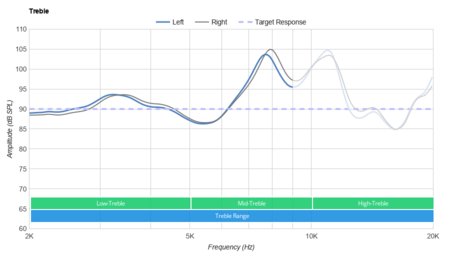
The Raycon E100's treble performance is okay. It lacks detail and brightness in the low-treble, which will mainly affect vocals and instruments. On the other hand, the response is noticeably over our target curve in the mid-treble, resulting in sharp and piercing sibilants (S and T sounds).

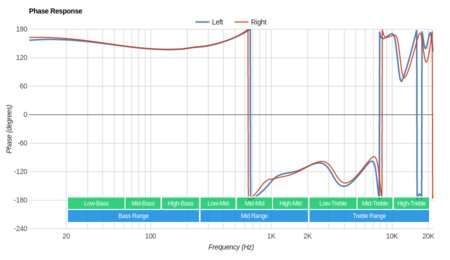
The Raycon E100's stereo imaging is incredible. The graph shows that the group delay is under the audibility threshold, resulting in tight bass and treble ranges. Also, the L/R drivers of our unit were very well-matched, which is important for the accurate placement and localization of objects (voices, instruments, video game effects) in the stereo image. Note that these results are only valid for our unit, and yours may perform differently.
The soundstage is bad. This is because creating an out-of-head and speaker-like soundstage is largely dependent on activating the resonances of the pinna. The design of in-ears and earbuds fully bypasses the pinna and doesn't interact with it. Also, because these headphones have a closed-back enclosure, their soundstage won't be perceived to be as open as that of open-back earbuds like the Apple AirPods (2nd generation) Truly Wireless, or the Bose SoundSport Free Truly Wireless.
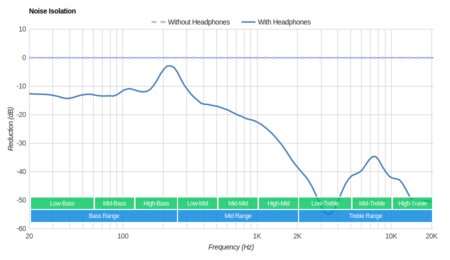
The Raycon E100's noise isolation performance is great. It does a decent job at blocking out bass frequencies like the deep rumble of a bus or plane engine, which makes them a good option for commuting. You can use them in an office setting as they do a very good job at isolating against work environment noise like ambient chatter and A/C systems.
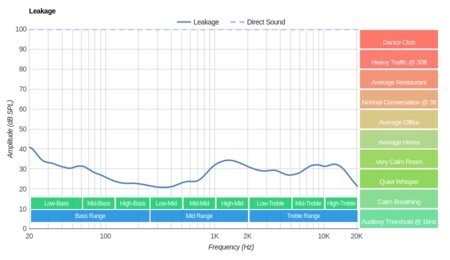
The Raycon E100's leakage performance is incredible. These in-ear headphones barely leak, so you won’t have to worry about disturbing surrounding people with your music. However, blasting your music at very high volumes in completely quiet environments might be audible to some.
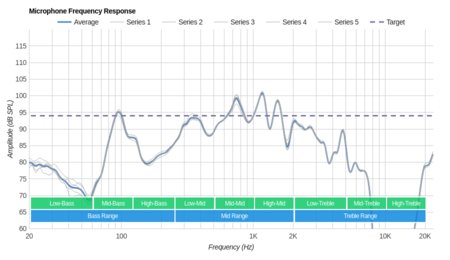
The recording quality of the Raycon E100's integrated microphone is sub-par. It sounds muffled and noticeably lacks detail. Recorded speech is understandable in very quiet environments, but the quality isn’t good.
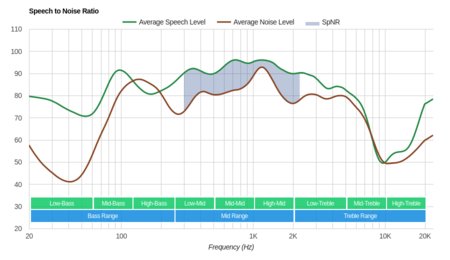
The Raycon E100’s integrated microphone's noise handling performance is sub-par. The mic has trouble separating ambient noise and recorded speech. People on the other line can have trouble understanding you in moderately loud situations like walking on a busy street. These headphones are better-suited for very quiet environments.
Their battery life is okay. They only provide about 3 1/2 hours of continuous playback time. They have a very similar battery performance to the Raycon E50 Truly Wireless. Similarly, they have an auto-off timer that is very useful as the headphones don’t necessarily power off when put in the case. If you forget to turn them off manually, you can play content even in their case. On the upside, the case holds about four extra charges, according to the manufacturer.
There's no dedicated companion app for the Raycon E100.
The Raycon E100 are Bluetooth 5.0 compatible, which means you might get better overall performance if your source supports it too. However, you can't pair it using NFC, although their pairing procedure was noticeably easier than the E50, which is nice. They also can only be connected to one device at a time.
Like the Raycon E50 Truly Wireless, the Raycon E100 have high latency with iOS and Android devices as well as PCs. This won’t be ideal for watching video content, as some people may notice a delay with audio. However, some devices and apps offer some compensation, so you might not notice it as much.
The Raycon E100 come with a hard charging case that serves as a charging station for your headphones wherever you are. It holds about four extra battery charges, according to the specs sheet.






